To start with, what are the best GPS for trucks?
They are Rand McNally TND 750, Garmin Dezl OTR800, Garmin Dezl 580 LMT-S, TomTom Trucker 620, OHREX GPS, and Garmin Dezl 780 LMT-S.
A contemporary GPS device can assist professional truck drivers with everything from truck-specific routes to real-time traffic and weather updates. The issue now is figuring out which one is worth your money. With so many options available today, choosing a specific GPS device is anything but straightforward. Drivers need a device that is intelligent, trustworthy, and straightforward. If you’re needing some guidance in the GPS buying process, we have the guide for you.
For more specific information, keep reading.
Best GPS For Trucks
Rand McNally TND 750: Best Overall
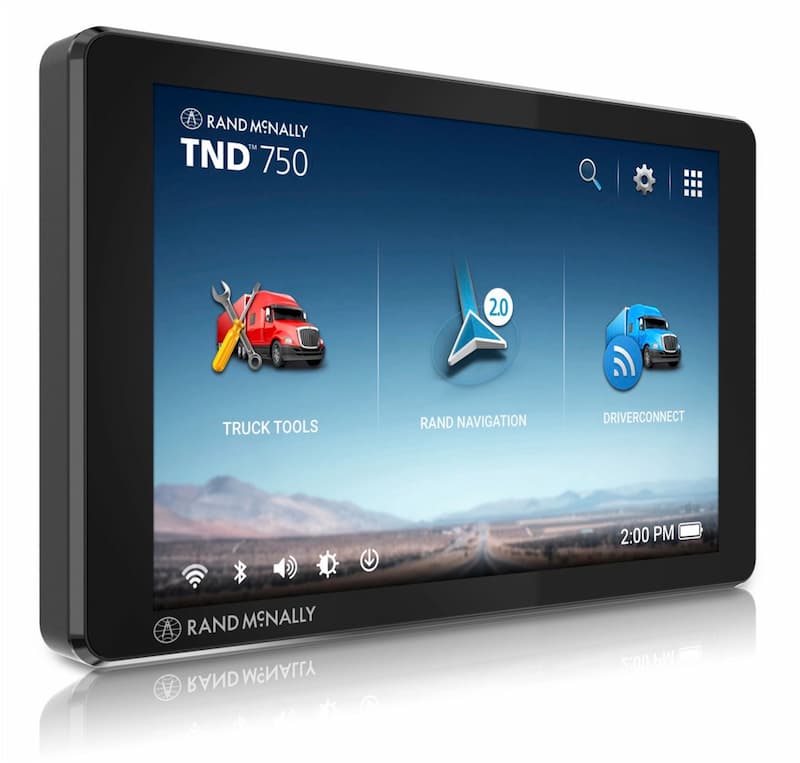
The large 7.0-inch screen on the Rand McNally TND 750 makes it very simple to read. Its on-screen alerts for changes in traffic patterns are excellent for truck routing and its live traffic alerts are also very useful. The 750’s 3D building and landmark tracking, dynamic weather overlays, and fuel and mileage calculators are additional useful features.
Truckers can quickly become familiar with the 750’s many features thanks to its user-friendly interface after just a few uses. In addition to being highly durable, the cutting-edge hardware in the 750 is ideal for daily driving.
Any trucker who requires a streamlined user experience, dependable navigation, and precise driver data tracking should consider the Rand McNally TND 750. We were astounded by how many extra features the TND 750 provided and were pleasantly surprised by how helpful they were.
Garmin Dezl OTR800: Most Versatile
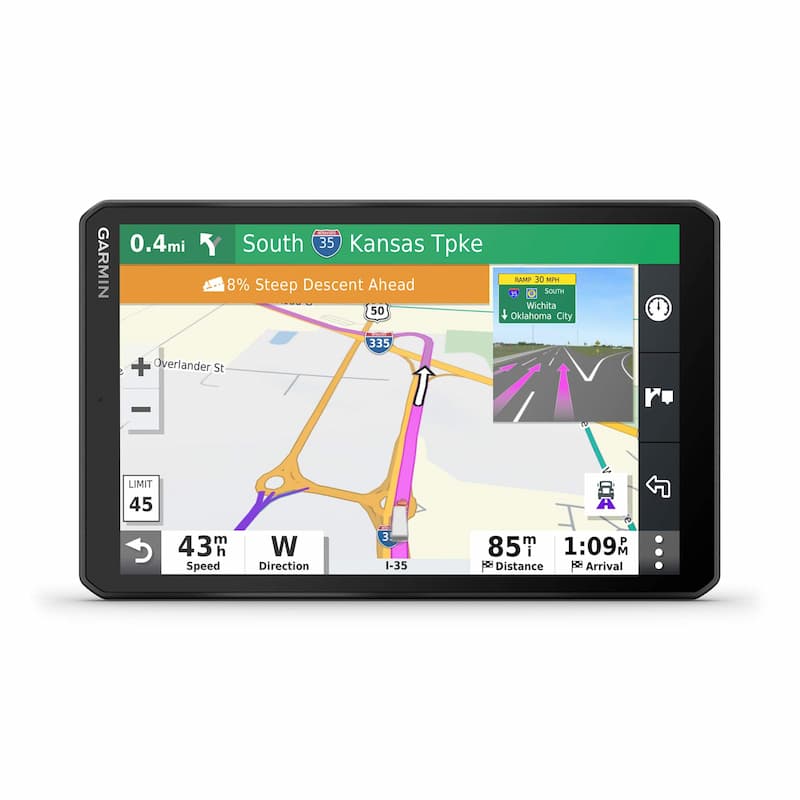
As one of the most reliable truck GPSs available on the market, the Garmin Dezl OTR800 delivers exceptional quality in a high-functioning package. Among other risks, this GPS provides real-time updates on traffic, bridge heights, and even the locations of potential sharp curves in the road. Additionally, it can identify parking spots near routes that are appropriate for trucks as well as potential loading areas or storage facilities.
One of the key features of the OTR800 is custom truck routing. Truckers can use this to find routes with adequate space and speed limits for safe travel. Additionally, it enables commercial truck drivers to see well-traveled routes so they can choose the best course of action.
The Garmin Dezl OTR800 has many benefits to improve your next trip for a truck GPS that is packed with extra features. It functions best for users who value real-time updates and prefer adaptable truck routes.
Garmin Dezl 580 LMT-S: Best Accessories
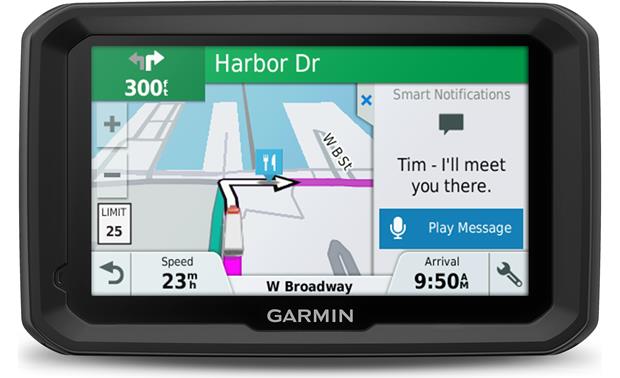
If a driver needs help finding rest stops, gas stations, and other locations after a long drive, the Garmin Dezl 580 LMT-S offers simple break planning. It’s Bluetooth®-compatible with most smartphones for hands-free calling and will even display text messages.
The LMT-S automatically updates for precise mapping when connected to the internet thanks to its built-in WiFi. Drivers can also send and receive texts through the LMT-S, which is useful for sharing addresses at a moment’s notice, thanks to the preloaded simple truck monitoring feature.
After reviewing the Garmin Dezl 580 LMT-S, we believe that it is best suited for people who enjoy simple installation and upkeep. For the best results, a WiFi connection is necessary, so this device benefits greatly from continuous internet access.
Tom Tom Trucker 620: Best Smartphone Compatibility
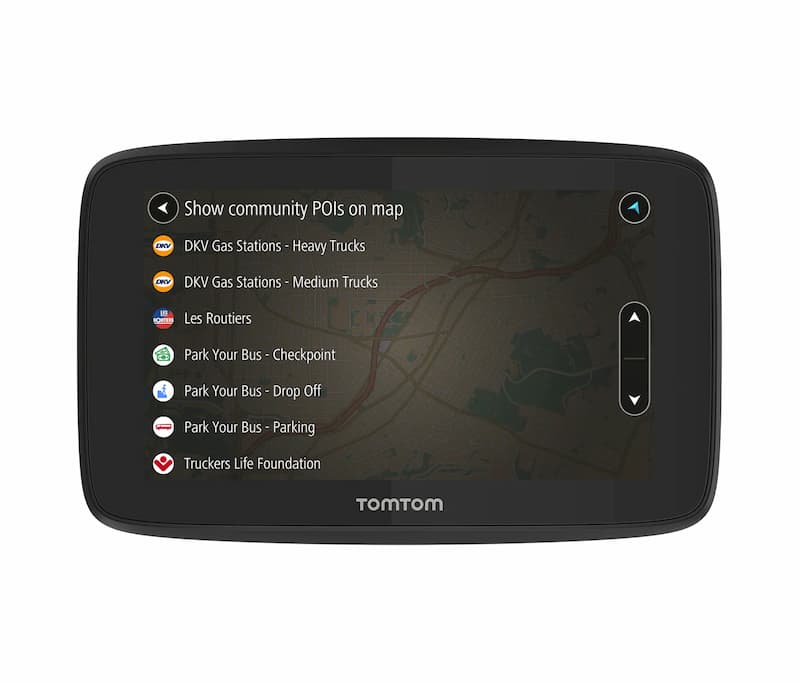
With TomTom MyDrive, users can pre-plan routes on their smartphone, laptop, or tablet and sync them to their TomTom Trucker 620. Over 1,500 preloaded truck-related points of interest are included, along with a 6.0-inch touchscreen, lifetime truck maps, real-time traffic updates, and more.
For improved safety, the Trucker 620 has hands-free calling and texting capabilities through Google Now and Siri. To help drivers concentrate on the road, it can even read incoming text messages aloud.
The TomTom Trucker 620 works well with other smart devices, though it may require some additional setup. We advise it for drivers who enjoy having their smart devices and truck GPS units connected.
OHREX GPS: Best Multi-use
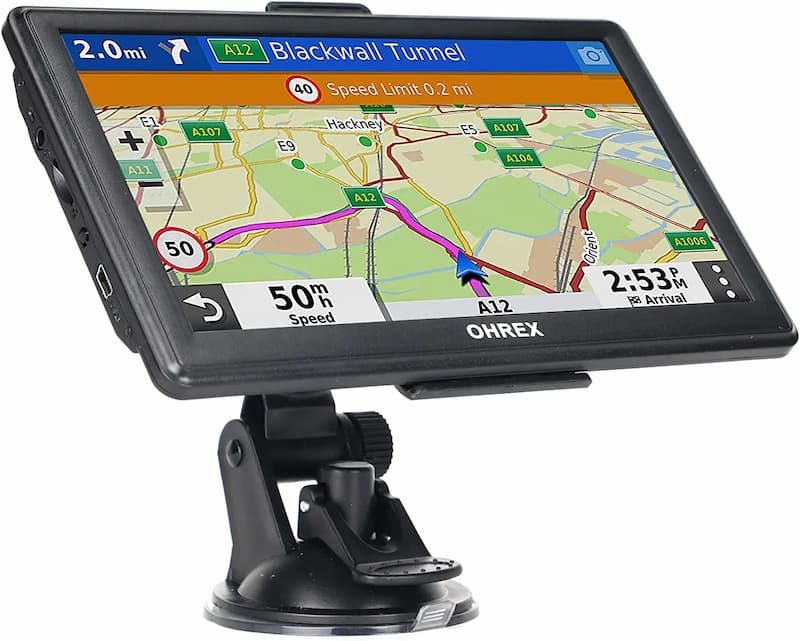
The OHREX GPS serves as a truck and car GPS and is the most cost-effective option in our review. It can easily switch between the two modes of transportation. It supports routing for trucks, cars, RVs, ambulances, buses, and even taxis.
With its integrated Bluetooth, the OHREX allows for hands-free calling while driving. It can give spoken turn-by-turn directions and alerts for potential road hazards like weight restrictions.
The OHREX GPS is the ideal truck GPS if you’re looking for a straightforward, entry-level device. It’s excellent for navigation, especially if you frequently switch between a truck and a personal vehicle.
Garmin Dezl 780 LMT-S: The Most Accurate Route Calculator
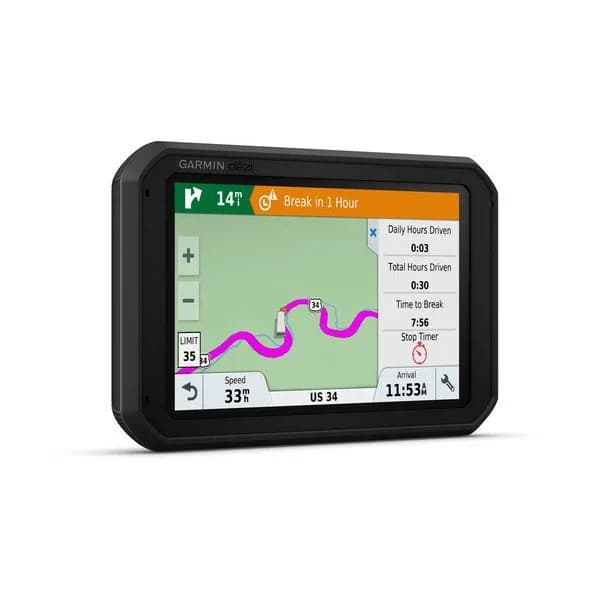
Our favorite truckers GPS navigation device in 2020 is the Garmin Dezl 780 because of its large 7-inch screen, rugged design, clear maps, directions, and excellent traffic alerts. It is also possible to buy with a small screen, the 580 has a 5-Inch screen, and even add a camera, the 785 can act as a dash-cam, however our favorite version is the 780 LMT-S that comes with a 7-Inch screen and step-by-step directions. The garmin was created with truckers in mind and includes settings that let you enter your truck’s length, weight, height, and width in order to calculate routes that take these factors into account.
We adore the Garmin Dezl 780 all around.
Why Should You Purchase A Truck GPS?
Legal Reasons
Why not just use the apps on your smartphone as a GPS for trucks?
Simple: the majority of jurisdictions have passed anti-distracted driving legislation outlawing the use of smartphones by drivers.
It follows that using a smartphone while driving is illegal regardless of whether you were checking your email, text messages, or the navigation app. A truck GPS, on the other hand, won’t land you in legal trouble.
Prioritize Truck Routes
Unlike other regular GPS devices or apps, a truck GPS will prioritize trucking routes.
For instance, you will learn about the weight restrictions, speed restrictions, and designated truck routes. The last thing you want is for your truck to become stuck underneath an overpass bridge that is too small for it to pass through.
Record Truck Reports
The top truck GPS systems will monitor the mileage, fuel usage, driving status, and service hours.
Beyond that, you can use the GPS in your truck to check the accuracy of the data in your electronic logging device.
Truck Access Services
A truck GPS does more than just provide directions; it can also help you locate truck stops, rest areas, repair shops, weigh stations, restaurants, and towing services that are specifically designed for commercial vehicle operators.
Get Weather & Traffic Alerts
A truck GPS will warn you in advance if the road is closed because of inclement weather or ongoing construction so you won’t be disappointed after setting out on a trip and discovering the road is closed.
In fact, some of the best GPS for truck drivers will alert you when there is a traffic jam and recommend a different route to save time and fuel.
Navigate Without An Internet Connection
Here’s the thing: most smartphone GPS apps require an internet connection.
A typical truck GPS, on the other hand, does not require an internet connection to navigate; this could be very useful if you are in a remote area without a network.
Manage Your Fleet
The fleet manager can keep tabs on a network of trucks that are on the road using a feature that some GPS devices have.
By sending real-time updates, the fleet manager can easily coordinate the shippers and receivers.
Compatibility
If a trucker GPS unit has Bluetooth and Wi-Fi capabilities, most of them work with smartphones.
Additionally, the majority of truck GPS units come equipped with microphones, speakers, and hands-free voice control. See more about Best Trucks For Hot Shotting.
GPS For Truckers Types
In-dash GPS System
The manufacturer pre-installs an in-dash GPS system into the dashboard, though you can also buy one and install it yourself.
An in-dash GPS can occasionally be connected to the infotainment system. That implies that the screen you use to access GPS navigation is also the one you use to change the playlist or turn on the radio.
The most significant drawback of the in-dash GPS system appears to be the possibility of the pre-loaded maps becoming out-of-date after a few years. Additionally, in-dash GPS systems are typically more expensive than portable GPS devices.
Of course, don’t forget the obvious: you can’t take an in-dash GPS outside of your truck. If you’re switching trucks and want to access your saved history, addresses, or points of interest, this could be a problem.
On the other hand, compared to a portable GPS device, an in-dash GPS is more difficult to steal or lose.
Handheld Or Portable GPS
In the 1970s, the United States military was the initial target market for the first handheld GPS device.
Later, in the 1980s, civilians were permitted to use it. The biggest benefit it has had since its inception is portability; you can take it with you wherever you go and still have access to your saved addresses, history, or points of interest.
Comparatively, handheld GPS devices are less expensive and more common than built-in GPS systems.
There is still room on the dashboard for a handheld GPS, even though it doesn’t come with the truck.
Ways To Choose The Best Gps For Truckers
Screen Display
Naturally, the size of the screen is what you will first notice about a GPS device.
It would be preferable if you settled for a GPS table with a screen size of at least 5 inches or greater since the navigation routes are typically displayed on the screen. You might find it challenging to read the map if the screen is too small.
Furthermore, you’ll be operating a truck during the day, so you should have a GPS tablet with adjustable brightness for daytime use. The best GPS for truckers automatically adjusts brightness levels to match the light and darkness conditions.
A touchscreen display is a standard component of almost every trucker GPS device available today, of course.
Mapping Information
How can you tell if the GPS you want to buy has a trustworthy mapping system?
The majority of contemporary truck GPS units will, firstly, offer a zoom feature that allows drivers to focus on specific roads and view them in three dimensions.
It’s crucial to purchase a GPS that includes lifetime map updates even if you don’t think the 3D option is necessary in case anything changes.
A thorough mapping program should also provide street names, speed limits, and turn-by-turn directions; if you happen to miss a turn, the GPS should let you know.
To make it simpler to plan your trip, the GPS tablet should also alert you to any nearby restaurants, hotels, truck stops, gas stations, or other points of interest along your route.
Approved Roadways
The weight, height, length, and cargo of your truck should be able to be entered into any truck GPS worth its salt so that the proper configurations can be made. In order to avoid colliding with low bridges or running into weight restrictions, the truck GPS will then select a predetermined route for your truck.
If you switch to a bigger or smaller truck, it shouldn’t be a problem because the best trucker GPS systems can handle multiple truck profiles. In addition, the GPS tablet ought to select the quickest and shortest route to your destination.
Driver Assist
We now have GPS devices that can speak voice instructions to you over a speaker. For instance, the voice assistant will direct you as you approach an intersection.
This means that since you will be listening to the voice assistant, you won’t be distracted by the GPS screen.
It could get even better; some GPS devices have a voice command feature that allows you to talk to the software.
For what it’s worth, by voicing a question like “Where am I?” you can activate a command.” and the Your coordinates will be pinpointed by GPS in response.
Connectivity
Although you might need a GPS with an integrated microphone and speaker, a GPS unit with Wi-Fi and Bluetooth can be paired with your smartphone to make a hands-free phone call.
Other than that, some of the best GPS for truckers have a port to connect backup cameras, USB cables, flash disks, and other electronic devices.
Live Traffic And Weather Alerts
Speaking of connectivity, if your trucker GPS tablet can access the internet, you shouldn’t have any trouble getting access to live traffic and current weather reports.
In this situation, a traffic update might include more information than just a warning about traffic congestion; the GPS might also alert you to accident hotspots, congested areas, steep inclines, and sharp curves. Even better, some GPS systems can direct you to the gas station with the best prices.
You should receive the latest weather information, including the forecast and any emergency alerts.
Do you want to be stranded during a hurricane?
Trip Logging
Even though a truck GPS cannot be used to comply with the electronic logging device (ELD) rule imposed by the Federal Motor Carrier Safety Administration (FMCSA), a GPS unit can record driving status, hours of service, fuel data, mileage, meal breaks, and hours of sleep.
Some GPS systems are compatible with electronic logging systems that are connected to the engine of your truck.
Fleet Management
If you are a fleet manager, you would want a GPS system that can communicate with your GPS units at the fleet base station.
In other words, you will be able to view the location of the trucks you are controlling in real-time.
So you can estimate your arrival time and let your clients know when to expect the pickup or delivery of their loads.
It goes without saying that the fleet management feature is very helpful if you want to keep an eye on the dependability and performance of truck drivers. In fact, if a truck is stolen, you can locate it using the GPS.
The End
Even though planning a trip can be challenging, adding a truck to the mix and navigating through crowded streets only adds to the stress. A trustworthy, cutting-edge truck GPS system is useful in situations like these. These tools design routes for trucks that steer clear of dangers like low bridges and congested roads, as well as areas that are challenging for big rigs to pass through. Additionally, they give truck drivers access to additional beneficial resources like weigh stations and truck stops that automobile global positioning systems (GPS) might miss.
Best wishes.
![6 Best GPS For Trucks In 2022 With Reasons [Updated]](https://www.truckcustom.com/wp-content/uploads/2022/09/6-Best-GPS-For-Trucks-In-2022-With-Reasons-Updated.jpg)